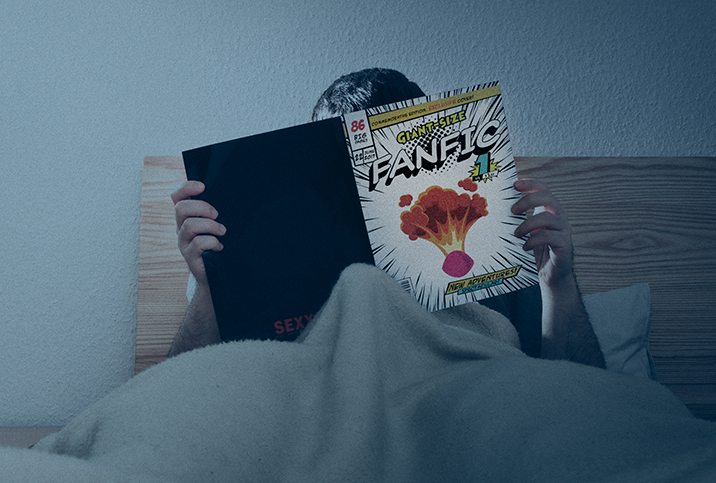How Fan Fiction Helped Me Reframe My Pleasure

It was while masturbating to a "Glee" one-shot story that I discovered I might be allergic to lavender.
I was in middle school, and had come across a cute little tale on Tumblr in which "Glee" character Sam Evans was scrambling in preparation for a romantic evening with Mercedes Jones. Following their cover of Michael Jackson's "Human Nature," Sam picked up her favorite chocolates, candles with her favorite scent and a bottle of massage oil. What followed was—in my preteen brain—an electrifying, passionate exchange centered around the pleasure of one of the few people on TV I could look at and say, "Huh. She kinda looks like me."
Moved by Sam's zeal and the couple's lust, I sped through the empty apartment to grab the bottle of lavender massage oil I knew my parents kept on their dresser. I ran back to my room, poured the oil into my hands and began to give myself a top-to-center massage. Within seconds, it felt like someone had taken a blowtorch straight to my labia minora. Curiosity had killed the cat.
One burning vagina and a lot of tears later, I was still thoroughly moved by the story. As someone who had been bigger their entire life, reading about a sexual exchange that featured a fat, Black girl's desires was earth-shattering. Did my vagina feel like I had sat down on a Hibachi grill? Absolutely. Still, I often note this experience as a pivotal turning point for my imagination, curiosity and ideas around my own desire and desirability.
Women and gender-nonconforming writers have always dominated fan fiction—stories by fans using existing characters and storylines. That's not by chance. It's partially a cry for better character development and more diverse casts, and also, in part, a grassroots way of developing an audience in response to being excluded from mainstream media. These two theories acknowledge a prime example of world-building when navigating an overwhelmingly white, heteronormative entertainment world. As disheartening as the media's shortcomings have always been, transformative fandoms have given many young writers a lot of hope in terms of sending better stories down our cultural canal.
Throughout the years, fan fiction has continuously shifted between high praise and heavy criticism. On the one hand, it is viewed as a space where younger writers can insert their own experiences and desires into standing fiction works. On the other hand, unimpressed consumers have called it "unoriginal" and "oversexualized." I'm pretty confident, though, that voracious readers of digital media and print literature alike can list numerous times we've endured writing by cis men that is unoriginal and oversexualized, among other things.
For me, fanfic is a tool for exploration. I read my fair share of cringe, which helped me pinpoint what I didn't want for my future pleasure-seeking. In the thick of my "Twilight" obsession, I remember searching for stories in which the writer made Bella fat. I preferred her to be paired with Jasper, fulfilling a Southern-drawl fantasy I had developed from watching "The Secret Life of Bees" way too many times. Reading these would excite me—until they didn't. Once Jasper started telling Bella how her pale, porcelain [insert other synonyms for white] skin turned him on, I knew it was time to exit. My discomfort with such descriptors helped me develop a sense of confidence when searching for stories I wanted to read.
Fan fiction, as with all forms of media, is not without its pitfalls. Among the widespread issues is the fetishization of gay men by cis women writers and of Black and Asian characters by white writers. However, for every questionable story, there are others that help curious, confused and excluded readers see themselves as being worthy and capable of love and desire.
When I look back on my days of avid fan fiction reading, it's hard not to smile. I remember loving the stories that described Mercedes as being as soft as she was fierce. I remember sitting with friends, laughing through terribly written stories, which sometimes led to impromptu talks about sexual curiosity. Fan fiction may not have been the best path for becoming a grammatically competent writer, but it taught me to treat my sexual, emotional and social inquisitions with a great deal of grace.

















